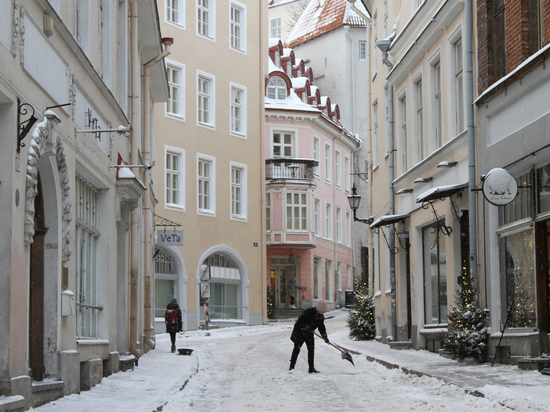Estonians spoke about the rise in prices and the indifference of the authorities
[ad_1]

Elena works at a school, lives with her husband and little daughter in the largest and most Russian-speaking district of Tallinn – Lasnamäe.
– Fearlessness and stupidity – that’s the motto of our president and members of her government – says the woman. – Probably, they were given to us for our sins. However, I’m not sure that we have sinned so much.
According to Lena, Russian school teachers are faced with a dilemma: either they must learn Estonian at an accelerated pace or look for another job. The relevant law was adopted by the government at the end of last year, and school directors, for example, must pass the language exam at the C1 level no later than August.
At the same time, politicians are not embarrassed that the Estonian language is considered very difficult, it is almost impossible to learn it in less than a year at such a high level.
Inspections by the language inspectorate revealed that 27 directors of secondary educational institutions do not speak Estonian, and in total more than three thousand teachers do not speak the state language of the country.
– First, where to get money for language courses? Elena asks. – The cheapest ones cost about 1000 euros. And secondly, where can teachers, who have a crazy workload at school, find more time to learn the language? For example, I leave the house when my child is still sleeping and return when she is already sleeping. Thanks to my mother, who took all the trouble about our life and raising her daughter. I’m not saying that now, when everything is becoming more expensive before our eyes and ordinary Estonians are barely making ends meet, carving out a thousand euros from the family budget for courses is an unrealistic task.
Therefore, among my colleagues, some chose to change their profession instead of spending money and time on courses. One went to work as a cashier in a supermarket, the other became a secretary in a firm. I don’t understand why the government creates problems out of the blue, because everyone knows that teachers in schools are already sorely lacking.
Another of our interlocutors is Olga Stepanovna, a pensioner. The woman lives alone in Narva, her children have long moved to live in old Europe, and although they regularly help her financially, it becomes more and more difficult to survive on a pension every day.
– Each of my trips to Maxima (a local retailer, like our chain stores) is a difficult test for the nervous system, – says Olga Stepanovna. – I have a pension of 600 euros, if not for the help of my son, I would eat meat only on holidays. For example, my lonely neighbor eats only cheap sausages.
The pensioner recalls that before the crisis she bought only Estonian products, especially dairy products. They have always been considered the most delicious and environmentally friendly. But now they are also the most expensive, so pensioners have become unaffordable.
“We have to buy Polish butter and cheeses, their taste is not at all the same as ours, but you don’t have to pick and choose with our pension,” grandmother sighs.
Nevertheless, Olga Stepanovna is sure that her family is still very lucky, because her son and daughter-in-law were able to settle in Finland before the crisis, where they have a good job with a high salary. If they had not left in due time, then perhaps they would have suffered the fate of the unemployed. After all, now almost every day dozens of enterprises are closed in Estonia.
Other Russian-speaking Estonians also talk about this. Unemployment and high inflation are the two main topics that ordinary people in Estonia are discussing right now. They are worried about what their children will eat tomorrow, and not at all a military threat from Russia.
“Many now perceive the closure of small and medium-sized enterprises in Estonia as a tragedy. For example, they recently laid off 138 people in a company that was engaged in timber processing – is this a lot or a little? But this process began many years ago. In the early 90s, tens of thousands of jobs were destroyed, then large factories and factories were closed, where the Russian-speaking population of Estonia mainly worked, local blogger Alexander is convinced. – 100 large world-class enterprises were destroyed, which could bring billions in profits and provide jobs for tens of thousands of people. At the Kalinin plant in Tallinn alone, 4,000 workers worked, at the Krenholm manufactory – 11,000 workers, and at Estkolkhozstroy – 18,000.
Alexander is sure that the Estonian government is disingenuous, assuring the population that it is not able to stop the rise in prices. According to him, it is enough to reduce taxes on food, essential goods, electricity, gas and motor fuel. This is minus 15% of current prices. In addition, it is necessary to reduce excise taxes on electricity, gas and fuel, which are currently the highest in Estonia in the EU. This is another minus 15%.
According to him, Estonians are a very restrained and patient nation, but even they are already losing their nerves. Increasingly, he hears from them reproaches against the president of the country for incompetence.
“People are already openly saying: stop scaring us with a war with Russia! Get to the bottom of your people’s business: take action to stop rising prices, help businesses survive the energy crisis, raise pensions and benefits so people don’t starve. Stop hysteria and help your people cope with the situation,” the blogger urges.
[ad_2]
Source link






